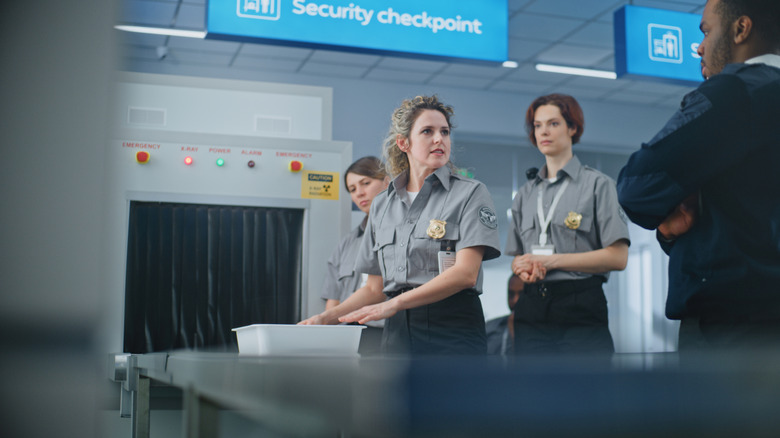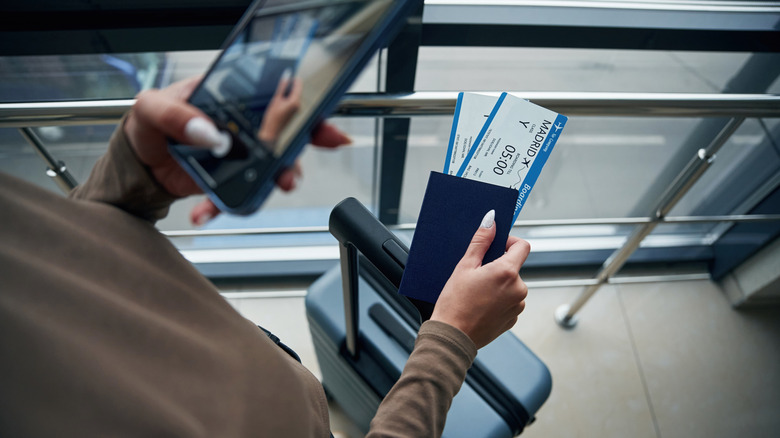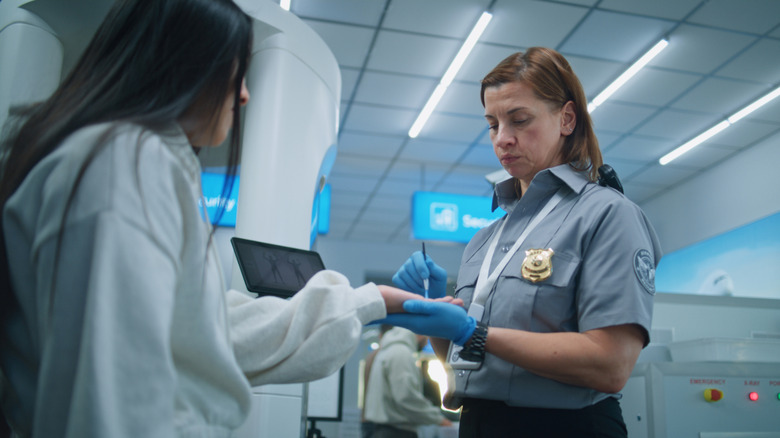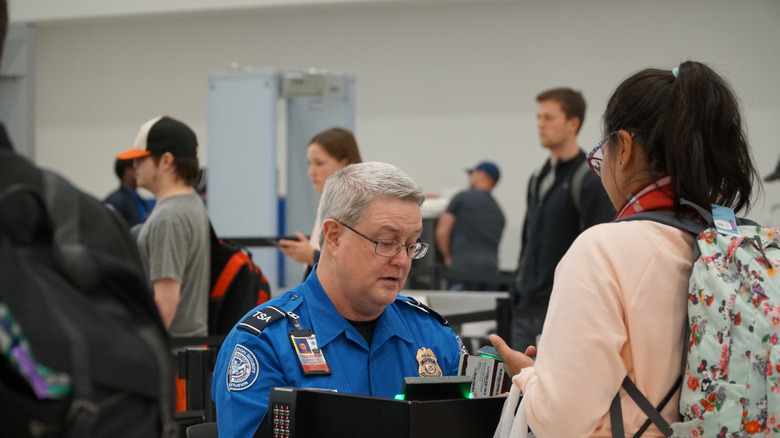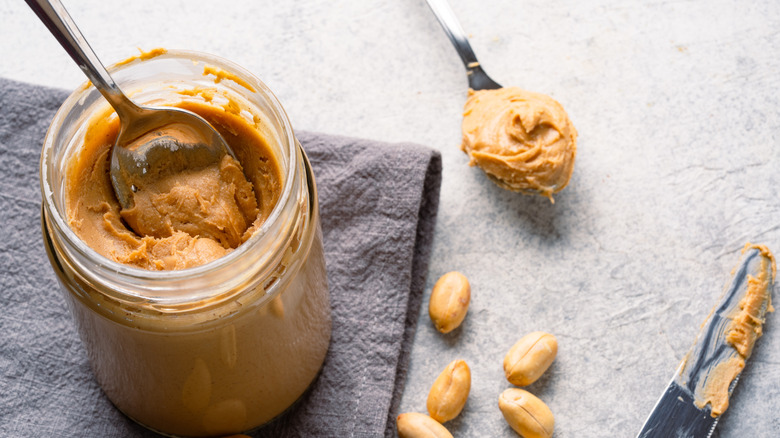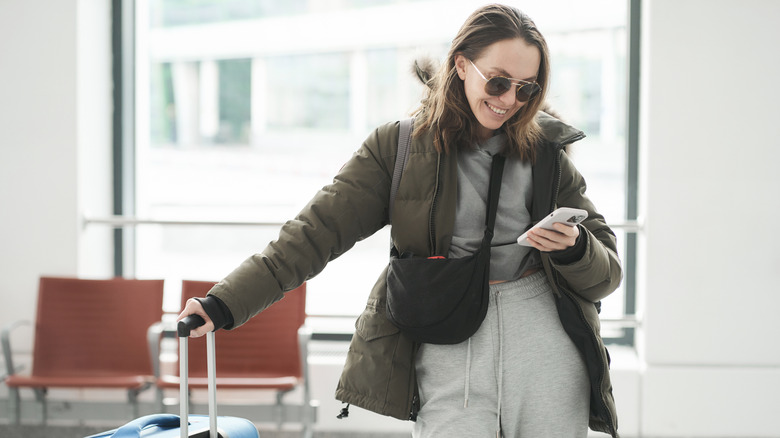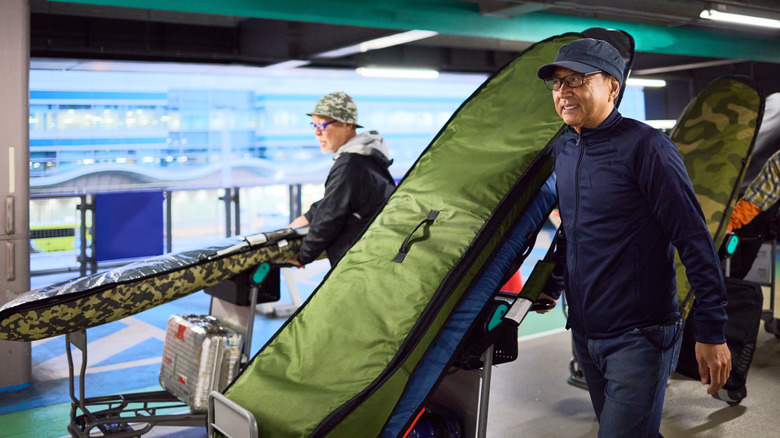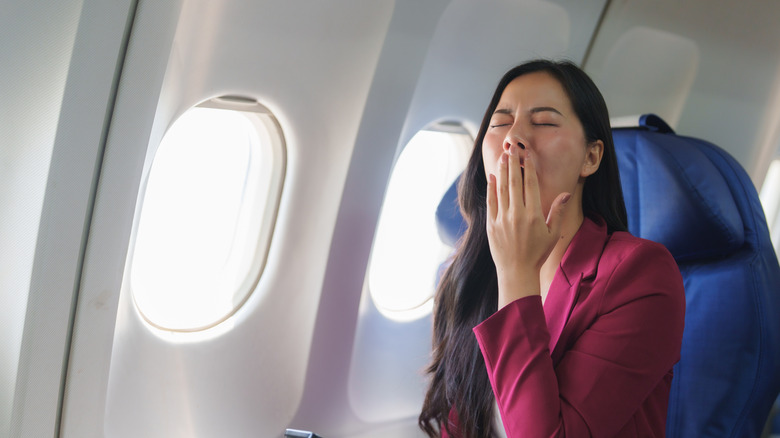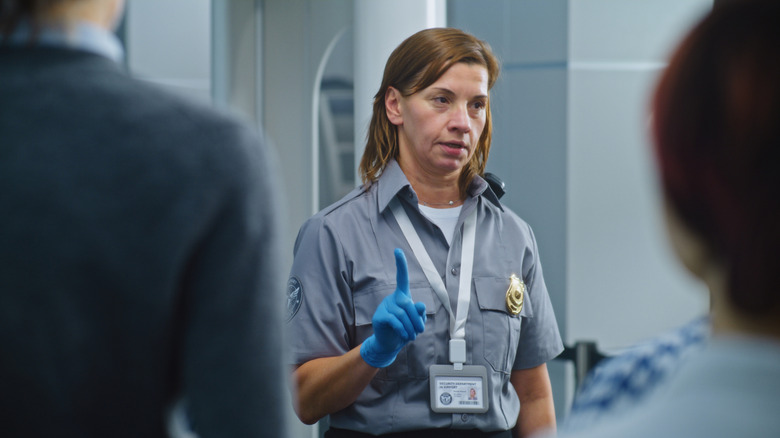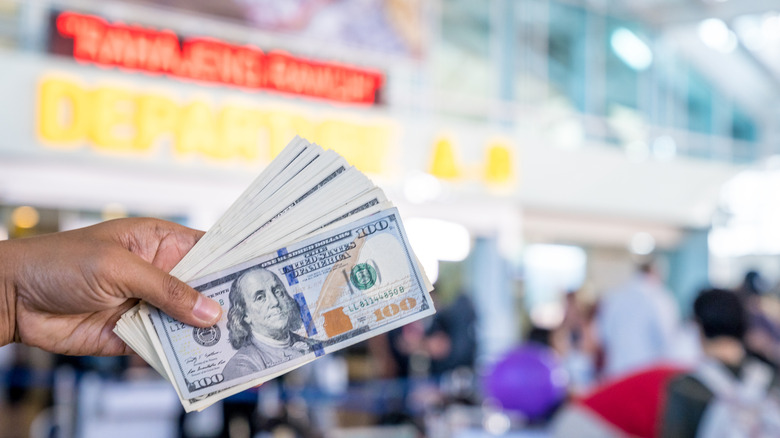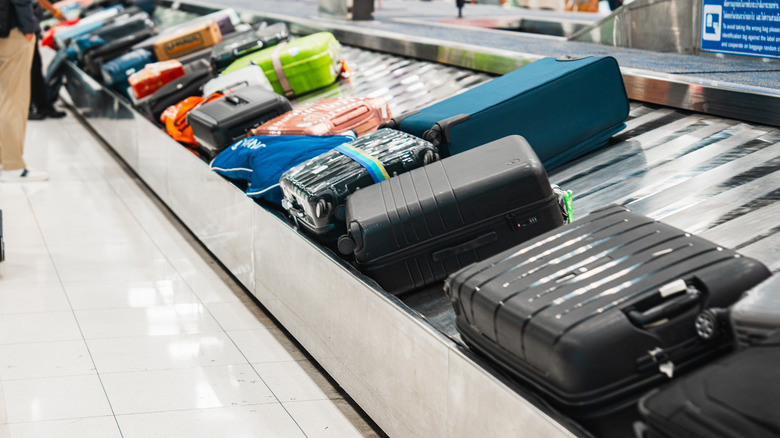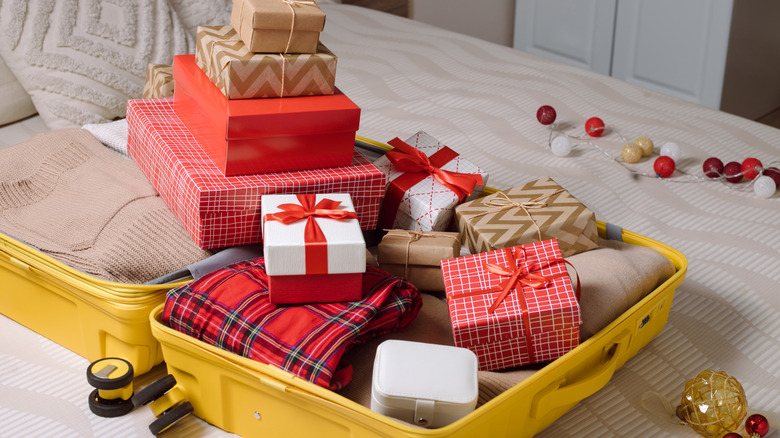Strange Triggers That Cause Secondary TSA Screenings
Airline travel is already stressful enough, thanks to long lines at TSA checkpoints where passengers must empty their pockets, remove their electronics, and submit to a body scanner in order to fly. That's just the start, and things aren't helped by how inconsistent TSA's rules seem to be. On top of that, there are a host of triggers that can result in passengers being pulled over for extra screening, ranging from a quick pat-down or swab test to a full-on bag search in which agents remove everything from your luggage and leave you to put it back together and make a mad dash for your flight. This includes carrying certain liquids, wearing certain creams, or wearing clothing (no joke).
Of course, if you have SSSS printed on your boarding pass — secondary security screening selection — then you will get searched no matter what. This is perhaps because you bought a ticket too close to your departure date, dared to pay in cash, or happened to have a name that is too similar to one on America's Most Wanted fugitives. There's no predicting whether you will be chosen because the TSA has never released its decision-making process, but here are some of the TSA's stranger triggers and what (if anything) can be done to avoid them.
Having a one-way ticket
There is nothing illegal about buying a one-way ticket. For example, you will buy such a ticket if you are moving abroad. However, having a one-way ticket can result in a passenger being flagged with the SSSS designation on their boarding pass, regardless of the circumstances of their purchase. The principal reason why one-way tickets are deemed suspicious is that the TSA assumes people purchasing them (in combination with other factors) are leaving the United States, either to evade capture for criminal activity or to head abroad for nefarious reasons.
In the former case, there are numerous circumstances. Perhaps a person might be a person of interest in a crime, or even be trying to skip bail. It is a stretch, but officers usually expect the worst. The latter case revolves around the increased focus on global terrorism in the years following 9/11. The United States views certain countries with extra scrutiny, seeing them as potential gateways to joining groups that have been designated as terrorists. If someone had a one-way ticket to one of these countries or a country near them, it could flag them as a potential recruit for dangerous groups. This is no empty suspicion, as several people have been arrested on exactly this charge.
Wearing certain creams or cosmetics
Carrying creams, gels, and liquids in excess of 3.4 ounces is a major thing to avoid if you want a simple stroll through TSA. However, even travelers who aren't carrying certain creams and gels can encounter an unexpected issue: These products sometimes trigger extra security after they have already been applied to the individual.
People who are selected for extra screening may be subjected to the TSA's swab test, which tests for residues of certain explosive chemicals that are used to make weapons. The chief among these is glycerin. However, one problem is that glycerin is also present in numerous everyday beauty products (and even food).
Due to this overlap between civilian and criminal use, innocent travelers wearing certain lotions and beauty products have found themselves facing a thorough inspection of their belongings in a separate room after their hands tested positive for glycerin. This can be a time-consuming task that, for a traveler running short on time, can be the difference between making the plane and missing the flight. The best bet here is to check the ingredients list before purchasing a beauty product and see if those chemicals fall into offending categories.
Contact lens or glasses cleaner
For individuals who wear glasses or contact lenses, having access to lens cleaner is essential. Without it, glasses and lenses can get dirty, making life extremely difficult, and this doesn't change on vacation. Unfortunately, these containers are often larger than the 3.4 ounces allowed by the TSA. What to do?
However, TSA rules allow for medically necessary liquids. Lens cleaning fluid falls under this designation, so it should be allowed to pass through without a problem, although there may be some further inspection, such as a swab test (similar to breast milk or baby formula). However, even medically necessary liquids are not allowed to go through the checkpoint if they are considered flammable. Given that most contact lens cleaners contain alcohol and other flammable ingredients, if security swabs the bottle and the liquid triggers any other sort of alarm, it will likely be confiscated.
If you are carrying contact lens cleaner, regardless of whether it is over 3.4 ounces, you will likely be flagged. If you don't want it to be confiscated, just leave the solution in your checked luggage and clean the lenses before boarding. At the very least, the relief when you finally clean your lenses or glasses at baggage collection will be wonderful.
Peanut butter
The status of peanut butter in the airport security world has been debated since the liquids ban dropped in 2006. The debate once again made it to X, formerly known as Twitter, when the official TSA account stated that peanut butter is a liquid. Users countered that it is a Bingham plastic (a type of fluid), but pointed out the absurdity of the TSA rules, which apparently don't consider peanut butter a liquid if it is already in a sandwich. The TSA account's response? "We said what we said." Hilarious internet back-and-forth aside, having a jar of the stuff will get you flagged, and not just because you are violating the TSA's 3-1-1 rule.
There are two main reasons why this snack food will get you pulled aside. Firstly, peanut butter won't look like peanut butter on the TSA scanner. Much like soft cheeses, it will look like C4 or some other high-density plastic explosive. Secondly, it hasn't been unheard of for individuals to attempt to hide drugs and other contraband in peanut butter, thinking it will hide the substance from TSA K-9 units and scanners. Drugs in peanut butter have consistently made the TSA's annual list of the agency's weirdest finds.
Of course, the peanut butter is going to get confiscated regardless of what's in it. So, if you have a jar of it, a reasonable agent might believe you have something to hide. After all, he or his co-workers probably already told you multiple times to dump it. Leave the jar at home (or in your checked baggage) unless you want to deal with a full-on search of your belongings and being treated as a potential criminal.
Bulky clothing
When it comes to dressing correctly for travel, it can seem like there is no winning with the TSA. According to travel experts interviewed by Today, anything too loose, too tight, or with too much metal can set off the TSA scanners and lead to pat-downs and extra security checks. As we know, that holds up the line and your trip.
Excessively loose or bulky clothing is considered suspicious, as the wearer may appear to be hiding something. Anything with too many pockets is also a trigger, meaning things like cargo pants are out. Underwire bras don't usually set off scanners or metal detectors, but women in larger sizes have reported being pulled aside for pat-downs to determine that they were indeed not hiding anything in their bras.
This is one of the stranger TSA triggers because it's harder to avoid; it's often luck of the draw. Today's experts recommend that female travelers wearing anything that could result in a pat-down not wear skimpy clothing underneath. If TSA requires an individual to remove the offending garment, the woman may find herself exposing more than she might feel comfortable with in public. In this case, the traveler should remember her rights: a pat-down in a private room by an officer of the same sex with a witness of her choice present.
Certain athletic equipment
It is not uncommon to see athletes traveling at American airports, usually college teams heading to away games or other sporting events. If you travel with athletic equipment, it is important to know that your gear may result in your bag being flagged for extra screening, even if you do not have the SSSS designation on your boarding pass.
This is because TSA considers any athletic equipment that can be used as a weapon as contraband. Many of these are understandable; a metal baseball bat or golf club can inflict some nasty injuries when used as a weapon. Strangely enough, this also includes bowling pins (which appear innocuous) and paddles. If you have any of these, you and your bag will be pulled aside for extra screening, and your equipment will be confiscated, regardless of your protests.
Unfortunately, it often comes down to the agents in charge. For instance, muscle-rolling sticks might set off scanners and lead to a bag search. Track and field shoes with metal spikes might lead to the same. Reddit users have reported all sorts of experiences, from being able to take shoes through without issue to being ordered to remove the spikes from the shoes and surrender them to agents. However, many of these are items that athletes cannot part with — they are essential to competing in their sports. To avoid having to make the decision between losing your equipment or going back to check it in and potentially missing your flight, pack everything in your checked bag (where possible).
Yawning (or being too quiet)
While travelers have a greater degree of control over previous triggers, this one is altogether more bizarre. Unfortunately, it also seems to be true, at least according to a SPOT Referral Report, which the TSA is said to use to assign threat scores to travelers based on certain activities (according to ABC News). It might seem like perfectly normal behavior, but excessive yawning can get you extra scrutiny from TSA agents. However, the agency has neither confirmed nor denied this.
The idea behind this is that people who yawn too much must be nervous and therefore have something to hide from agents. How exactly the agency decides what is "too much" is a mystery. Agents are supposed to look for a combination of factors, of which excess reflex behaviors are just one criterion. If you find yourself in line, just act like you would anywhere else, although this advice is just as vague as the issue.
Talking too much
While yawning or clearing your throat too much sometimes can't be avoided, as passengers are often tired and sometimes sick, talking too much is another story entirely. TSA agents have to deal with a lot of people. Around 3 to 4 million people, per TSA's own numbers, pass through checkpoints daily. Among them are genuine troublemakers who complain, try to sneak stuff through, and generally just cause problems. Naturally, officers aren't usually interested in small talk, and given the agency's subpar reputation, most passengers probably aren't interested in chatting with agents. Given this friction, it is reasonable for the agent to believe that anyone talking to them beyond what is necessary might have ulterior motives.
Talking too much to a TSA agent can get you hit with extra screening, as the agent might believe you are attempting to run interference and distract them from their duties. While small talk (even that which is well-intended to cut through the tension at the checkpoint) might seem innocuous, passengers should be careful. If an officer decides your chatter is interfering with him or others doing their jobs, you can be hit with fines of up to $13,000. Don't bother with small talk. Get through the checkpoint, keep interactions courteous, and move on. And don't even think about making a joke, as that's one major airport mistake that will slow you down (at best).
Carrying large amounts of cash or using it to buy tickets
Cash has received a bad rep over the last few years. The pandemic caused much of that, but it is also considered (by some) to be the method preferred by tax evaders and drug traffickers. After all, it is more challenging to track cash transactions than those done digitally. This extends to the TSA, which will likely flag travelers who pay for flights in cash.
When a traveler purchases a flight by credit card, the transaction, itinerary, and identity of those traveling can be traced by anyone who wants to request those records. This includes federal agencies, which can access such records without needing a warrant thanks to the Patriot Act. Thus, anyone who uses cash for flights — especially the large amounts needed to purchase international flights — will naturally raise suspicion. That said, simply paying in cash will not in itself get one flagged. The agency determines whether to apply the SSSS label in conjunction with other factors, such as whether the ticket was bought on short notice, whether it is a one-way ticket, the length of travel, the destination, and the identity of the purchaser.
Travelers should think twice before carrying large sums of cash through a checkpoint. While this is not illegal, it can set off suspicions of criminal activity. Agents cannot take cash, but they can contact other agencies that can hit you with civil asset forfeiture or other seizures if they suspect criminal activity.
Lack of checked bags
If a traveler is going abroad or even on a longer domestic flight, it makes sense to expect that person to have checked bags. Not having checked bags on these flights can be a trigger for additional security, particularly if there are other signs of suspicious activity. Criminal activity is believed to have begun taking advantage of this situation.
As reported by the New York Post, drug traffickers will bribe rogue airport workers and TSA agents to hide drugs in the checked bag of an innocent third party, thus avoiding bringing the product in their own checked bag or carry-on that would link them to the crime. Once the trafficker arrives at his destination, another rogue official removes the drugs from the bag before it reaches its rightful owner and returns the contraband to the trafficker.
There is really no avoiding scrutiny if you decide to travel on a long-haul flight without checked baggage. This is your right, but again, it can trigger alarm bells in the mind of an officer. As ever, if you do not trigger any other alarms, you should be fine.
Snow globes
This one is for the tourists bringing back knick-knacks from their travels. If you visit New York City, Rome, Paris, Dubai, or any other major destination, it is not uncommon to bring back a snow globe as a souvenir. They are cheap, easy to find, and make great gifts. The only problem is that if you are bringing them through the TSA checkpoint, you might not be allowed to keep them. That's right — the TSA considers snow globes to be contraband if the amount of liquid contained inside exceeds 3.4 ounces.
If you are a traveler carrying a snow globe, it will be flagged if it goes through the scanner. Most likely, it will be thrown away if security deems that the amount of liquid in there is larger than the volume of a tennis ball. The only way to prove that it meets TSA standards is if you can show that the snow globe and the base together fit inside a resealable, clear, quart plastic bag that is used to transport liquids under the TSA's 3-1-1 rule. The rule seems a bit absurd, as the base isn't what contains the liquid, but nonetheless, that is what the TSA demands. If you are traveling with these and don't want to risk losing them, just buy them after the checkpoint. Alternatively, pack the souvenirs in your checked baggage.
Wrapped gifts
During the holidays, it is always a good idea to buy gifts before traveling. Many stores might even wrap the gifts. However, if you are traveling by air, don't take your wrapped gifts through TSA, or you will face extra security screening. Understandably, wrapped gifts will always be pulled aside to determine that the wrapping isn't a decoy for a prohibited item.
Electronics, for instance, are an increasingly frequent gift, but they will not be allowed through security if they are gift-wrapped. This is to ensure that they really are electronics and not decoy bombs. Certain liquids (like jams) are also prohibited in this form, as TSA needs to be able to see and confiscate those. The lesson here is to not wrap gifts until after you arrive at your destination, while another option is to use a gift box that agents can easily open and close again.
